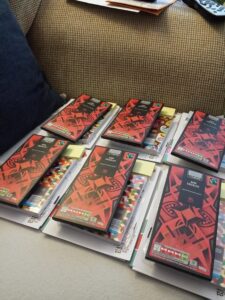Five years ago today I ran my first ever independent workshop.
I was so excited!
It was a big step: to go from being invited by universities to meet PhD candidates, now instead I was inviting them to meet me. I’ve done that a lot in the last year over Eventbrite and Zoom, but to hire a venue, to advertise, to think about everything that I would want or need if I were a participant – this was a really big stretch for me then.
It was a lot of work, but also a lot of fun.
One of the things I was most delighted about, aside from the great venue that I found and the four people who took a chance to come to the event, was making goody bags. I wanted to give everyone who came a bag packed with everything they would need to help them get ready for the viva – and a few things that they didn’t need, but which would maybe give them a smile.

I made a print run of the books I had written, and gave ebook codes too; I designed and published a new guide to getting ready for the viva; I supplied stationery that would help, notebooks – plus a big bar of dark chocolate and a tote bag to carry it all in.
I loved putting all of this together – most of the contents were a surprise to the participants on the day, and the looks of delight at the goody bags I gave were some of my highlights of 2016.
Which leads me to ask three questions, two for you and one for me.
- First, if your viva was coming up: what would you need in an essential goody bag to support you? What would you want? What would be nice? What would help you just that little bit more?
- Second, if you have a friend with a viva soon: what could you do to give them a little boost? What practical things could help them get ready? What else could you do to make them smile?
- And for me: what can I do with my Zoom sessions to bring a little of that surprise and delight that I loved so much in my very first independent seminar?
